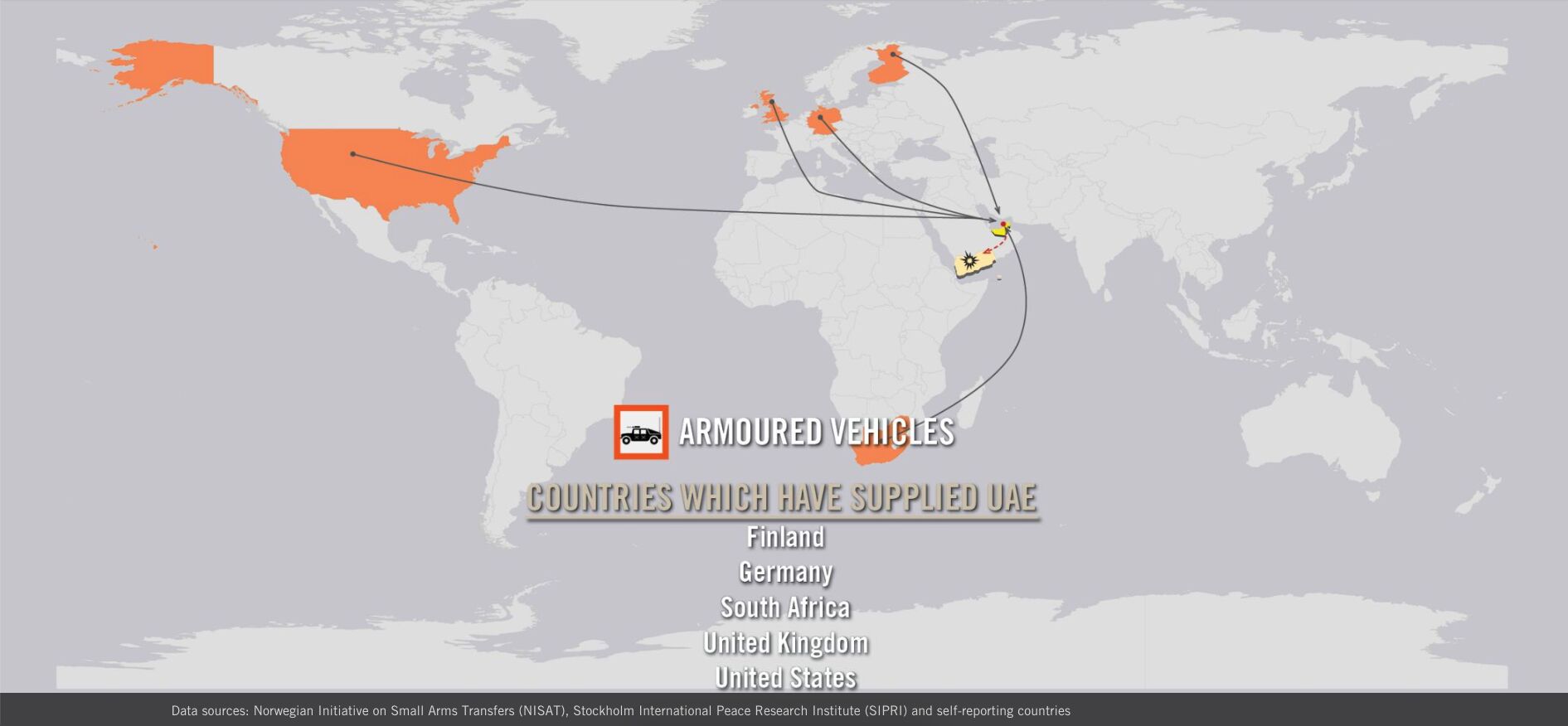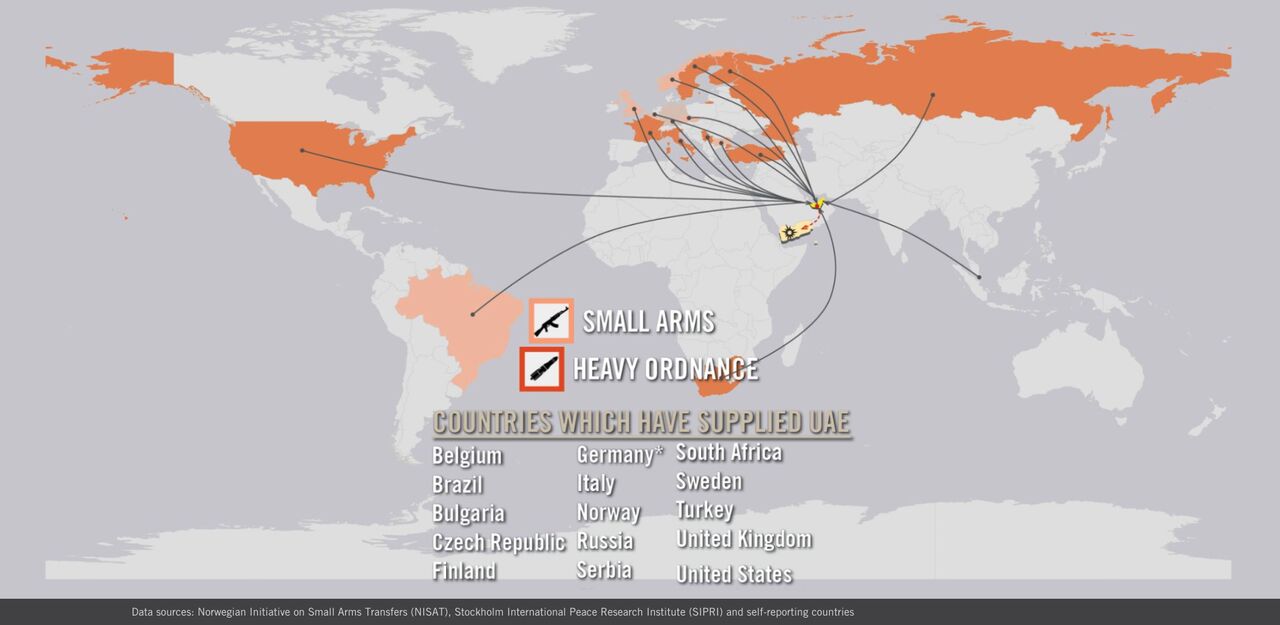According to Defenceweb, in 2014 South Africa concluded a major contract for Yemeni-assembled armoured vehicles and delivered four artillery systems to Saudi Arabia. (Amnesty International)
An investigation published by Amnesty International on Wednesday suggests South African arms sold to the United Arab Emirates (UAE) are being diverted to militias accused of war crimes in Yemen.
Titled “When arms go astray: Yemen’s deadly new threat of arms diversion to militias,” the investigation details how the UAE has become a major conduit for armoured vehicles, mortar systems, rifles, pistols, and machine guns — which are being illicitly diverted to militias accused of war crimes and other serious violations.
Yemen has been at war since late 2014, when Houthi rebels — allied with troops loyal to former President Ali Abdullah Saleh — captured much of the country, including the capital, Sana’a. The Houthis are said to be backed by Iran, Saudi Arabia’s nemesis in the region.
In March 2015, a Saudi Arabia-led coalition launched an aerial bombing campaign which was followed by ground incursions against the rebels in a bid to restore the internationally recognised government of President Abd Rabbu Mansour Hadi.
Despite the humanitarian destruction the war has wrought, South African weapons companies have continued to supply Saudi Arabia and its allies with weapons for a campaign that according to the United Nations has been characterised by human rights violations, including war crimes. Between 2016 and 2017 alone, South African companies sold arms worth more than R3-billion to Saudi Arabia and the UAE.
The National Conventional Arms Control Committee (NCACC), the South African authority that oversees arms exports and regulates South African weapons companies, has been accused of laxity when it comes to ensuring that local arms dealers comply with its regulations.

According to Defenceweb, in 2014 South Africa concluded a major contract for Yemeni-assembled armoured vehicles and delivered four artillery systems to Saudi Arabia.
South African artillery and military hardware, including the G6 howitzer made by Denel, have been sighted on Yemeni battlefields. In July 2015, footage appeared to show a Denel-made Seeker II drone shot down over Yemen.
By supplying weapons to the coalition, South Africa may be in breach of its own Conventional Arms Control Act, which states that the government should not export arms to “governments that systematically violate or suppress human rights and fundamental freedoms”, and should “avoid transfers of conventional arms that are likely to contribute to the escalation of regional military conflicts”. South Africa and Yemen concluded diplomatic relations in 1996. There is no South African representation in Yemen, but the South African Ambassador to Riyadh is accredited to Yemen on a non-resident basis.
Amnesty International analysed open-source evidence around the battle for Yemen’s principal port city Hodeidah and found that military vehicles and weapons supplied to the UAE are now widely in use by militias on the ground. “While the USA, the UK, France and other European states have rightly been criticised for supplying arms to Coalition forces, and Iran has been implicated in sending arms to the Huthis, a deadly new threat is emerging. Yemen is quickly becoming a safe haven for UAE-backed militias that are largely unaccountable,” Patrick Wilcken, a researcher at Amnesty International said.
“Emirati forces receive billions of dollars’ worth of arms from Western states and others, only to siphon them off to militias in Yemen that answer to no-one and are known to be committing war crimes. “The proliferation of these fighting forces is a recipe for disaster for Yemeni civilians who have already been killed in their thousands, while millions more are on the brink of famine as a direct result of the war.”
The armed groups on the receiving end of these dodgy arms deals – including “The Giants”, the Security Belt and Elite Forces – are trained and funded by the UAE, but are not accountable to any government. Some stand accused of war crimes, including during the recent offensive on Hodeidah and in the UAE-backed network of secret prisons in southern Yemen.
Since the beginning of the Yemeni conflict, Western states and others have supplied the UAE with more than US$5-billion worth of heavy conventional weapons — including aircraft and ships — small arms, light weapons and associated parts and ammunition.
According to data collected by Amnesty International – one of the main sources used in the research – between 2015 and the end of 2017, South Africa transferred US$62-million worth of major conventional weapons to the UAE.

Despite the serious violations attributed to the UAE and militias it backs, the following countries have recently supplied the Emiratis with arms: Australia, Belgium, Brazil, Bulgaria, Czechia, France, Germany, South Africa, South Korea, Turkey, the UK and the USA, among others.
Denmark, Finland, the Netherlands and Norway have recently announced suspending arms transfers to the UAE.
Amnesty International and others have previously documented these forces’ role in enforced disappearances and other violations at facilities – including detention at gunpoint, torture with electric shocks, waterboarding, hanging from the ceiling, sexual humiliation, prolonged solitary confinement, squalid conditions and inadequate food and water. The UAE-backed militias running these black sites wield Bulgarian rifles and drive US armoured vehicles. Many of the states that continue to supply arms to the UAE are party to the global Arms Trade Treaty. Some have other legal obligations as EU members or under domestic laws not to transfer arms being used to commit war crimes.